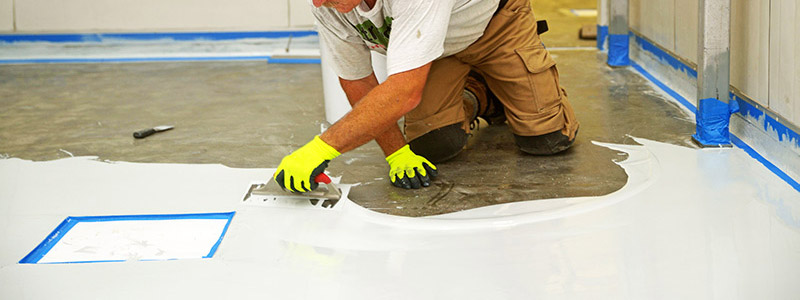We often get asked about the safety of epoxy flooring, and it’s a great question. Many people know epoxy as a very pungent material that is rather toxic in its liquid form. It’s no wonder people want to make sure it’s not just safe to breathe but also live around for the years to come.
It’s exciting to get to flooring projects in your home or business. They are literally the foundation of your space, which means it’s a rather intense decision to come to. As you shop for different flooring systems, you’ll have considerations with all of them. Aside from epoxy being a beautiful option with endless style and customization options, it’s also safe, and we are going to explain why.
EPOXY COMPOUNDS 101
Think of epoxy in two parts: 1 part resin and 1 part hardener. When materials are broken down into their parts, the materials contain prepolymer and polymers. You’ll also find what are called, polyepoxides which are uncured epoxides. The hardener compounds are what make the resins “cure.” The chemical reaction of all of these things combining helps the material to solidify. It’s this solid form that gives you the hard epoxy coating. Hardeners are made up of amidoamine, anhydride, or polyamide-based chemicals, or a combination of these.
The ideal temperature for curing these materials is between 72-85 degrees Fahrenheit. But many installers can work with cooler temperatures depending on the space and conditions. Cooler temps are fine (nothing less than around 55-degrees), but know that it will take a bit longer for the material to cure. Did you know that once the material does cure, it can withstand 0-140-degrees?
TOXICITY
We encourage people to understand their epoxy projects and to do their research. This goes for ANY material they put in their homes or businesses. We also love to share with clients; epoxy is one of the more safe options to choose from. The chemicals in epoxy are non-toxic unless they are in high quantities. Standard projects don’t typically produce this many toxins, with the exception of large warehouse-style jobs. Even then, the companies that handle these jobs are well aware of the risk factors and take the necessary precautions for themselves and the occupants. The risks come in these forms generally:
- Ingested through the mouth
- Inhalation of the fumes or dust during application
- Through the skin, if it sits too long.
Most of the problems with epoxy being “toxic” come during the application and curing times. If you are having this installation done by a company like ours, chances are you won’t have to deal with much of this. But if you’re doing this yourself or plan to live in the space while this project is underway, you either need to take the right safety gear precautions or make plans to stay with friends and family. We suggest not placing yourself in any preventable risk-taking places if you don’t have to.
The fumes can cause respiratory complications that you’ll feel in your nose or throat, with an unknown impact on your lungs. The fumes or particles can also trigger asthmatics. The dust that transpires in the installation process is also problematic because the particles cannot make their way out of your system. Your body will try to attack the particles, but it won’t have a way of getting rid of the material. This is dangerous and can cause serious health problems. If you hire a company to install these floors, they will likely take abundant precautions to protect you and your family. For example, we will intricately clean the space when the epoxy has cured. We will also give you specific timelines so you can plan your departures and returns.
HEALTH COMPLICATIONS
Epoxy resins of the past are known to be harmful or cause cancer. As more has been learned about the chemicals, those compounds have been removed from epoxy. Some may contain some of these compounds in unharmful trace amounts. As with most things in today’s world, technology has gotten better, and products are being developed in safer ways.
We have spent many years sourcing the right materials from reputable manufacturers who keep safety a top priority. This might not seem like a big deal, but when we are talking about our clients’ health, we tend to take these things seriously. We like to know where our materials are coming from and work with reputable suppliers who offer the best in safety guidelines and adhere to industry standards for their materials.
QUESTIONS TO ASK YOUR INSTALLER
We thought it might be helpful to create a list of questions (regarding safety) that you can take to your installer. For reference, we welcome these questions at our business and ensure customers understand all the safety details about their project.
- Where do your materials come from, and what can you tell me about your manufacturing partners?
- How long have you been working with your suppliers?
- What kind of safety precautions do you take to ensure my family or employees are safe?
- Have you had any complications or adverse reactions from your clients?
- Can you explain your safety procedures to me?

